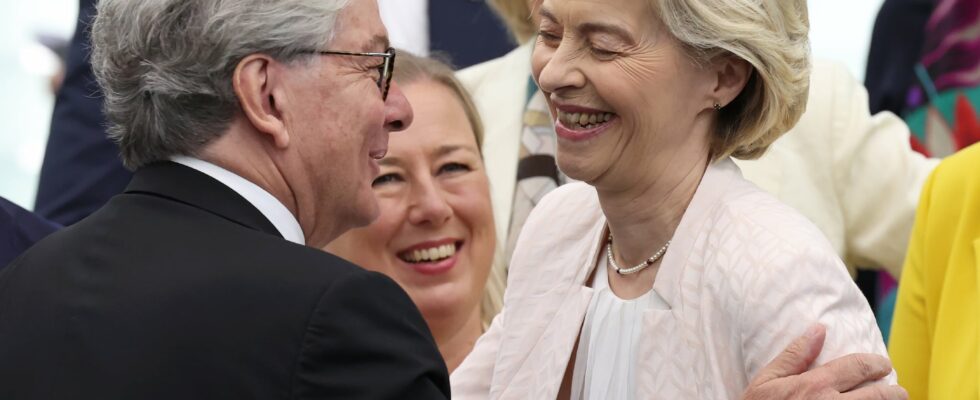Negotiations are dragging on in the European Parliament. Ursula von der Leyen must define the profiles and responsibilities of the commissioners, one per state, who will make up this new executive for the period 2024-2029. The distribution of the largest portfolios will send a signal about the weight of each member state and each political group and will give an indication of the broad directions that the Commission intends to drive, three months after European elections marked by a surge in the far right.
The presentation of the new team of European commissioners who will support President Ursula von der Leyen, re-elected in July, was expected on Wednesday 11 September in Brussels. It has been postponed to Tuesday 17 September in Strasbourg, but remains uncertain due to numerous upheavals in the appointments.
Thierry Breton resigns
Starting with the resounding resignation of Frenchman Thierry Breton, until then European Commissioner for the Internal Market. He slammed the door of the European Commission on Monday 16 September in the morning, saying he had been disavowed by President Ursula von der Leyen, in the midst of negotiations over the composition of the new team. “I am resigning from my position as European Commissioner, with immediate effect,” announced Thierry Breton in a letter to Ursula von der Leyen published in the morning on the social network X.
Officially Emmanuel Macron’s candidate, he explained that the head of the European executive, in the process of forming her team for a new five-year term, had “asked France to withdraw (s) his name”. “A few days ago, in the very last stretch of the negotiations on the composition of the future College, you asked France to withdraw my name – for personal reasons that you never discussed directly with me – and proposed, as a political compromise, a supposedly more influential portfolio for France within the future College” of commissioners, writes Thierry Breton. It was finally Stéphane Séjourné, the resigning Minister of Foreign Affairs, who was proposed at midday by Emmanuel Macron.
Relations between the German leader and Thierry Breton have been notoriously tense since the latter took the lead in the spring of a revolt within the Brussels executive to contest the president’s leadership style, which was considered to be lacking in collective leadership.
Blockade in Slovenia
Before Thierry Breton’s withdrawal, the situation was already uncertain due to a blockage on the Slovenian side, where the approval of the new candidate Marta Kos by the national Parliament is awaited. Without having the name of a commissioner for the country, the Commission has for the moment confirmed the announcement schedule, set for Tuesday 17 September. “There is still plenty of time before Tuesday morning, isn’t there?”, reacted spokesperson Eric Mamer, during the daily press briefing in Brussels. “24 hours is an eternity in politics […] So the goal remains for the president (von der Leyen) to reveal her casting on Tuesday.
The head of the Slovenian parliamentary committee Franc Breznik says he cannot, due to a lack of necessary documents, proceed with the hearing of the new candidate, chosen after the withdrawal of the first choice Tomaz Vesel. “We have information that he did not withdraw his candidacy on his own initiative but after Ursula von der Leyen sent a letter” to the government, demanding the appointment of a woman to rebalance the composition of her team. Liberal Prime Minister Robert Golob castigated “manoeuvres by the opposition to delay the process”, recalling that he was not legally obliged to respect the decision of the parliamentary committee anyway.
Meloni’s Minister Appointed as Vice President
Although it has since faded, opposition to granting an executive vice-presidency of the European Commission to Italian Minister Raffaele Fitto (Brothers of Italy) has been tough. While the presentation of the new European Commission has been delayed, mediation has continued in recent days between Ursula von der Leyen and the groups forming the pro-EU majority in Parliament – EPP, S&D, Renew, Greens. The latter three have expressed their opposition to Ursula von der Leyen’s (CDU, EPP) plan to give a member of the European Conservatives and Reformists (ECR) group an executive vice-presidency of the Commission, Raffaele Fitto belonging to Brothers of Italythe far-right party of Italian Prime Minister Giorgia Meloni.
Among the Italian MEPs, the Greens and the 5 Star Movement (the Left group in the European Parliament) have announced their categorical opposition to granting an executive vice-presidency to the Italian candidate. This gives Commission President Ursula von der Leyen even more trouble. “The refusal of the Social Democrats and the Greens to a candidate from the Conservatives and Reformists [CRE, droite/extrême droite]the party that voted against the election of the Commission president, comes at just the right time,” reports the Italian newspaper. Corriere della Serra. “It complicates the appointment of the Minister Fratelli d’Italia (FDI) Raffaele Fitto to the position of Vice-President of the Commission.” However, the difficulties in the appointment of Raffaele Fitto by Ursula von der Leyen “confirms that the negative repercussions of the vote of Meloni and the ECR against the new Commission have been underestimated,” concludes the Italian daily.
